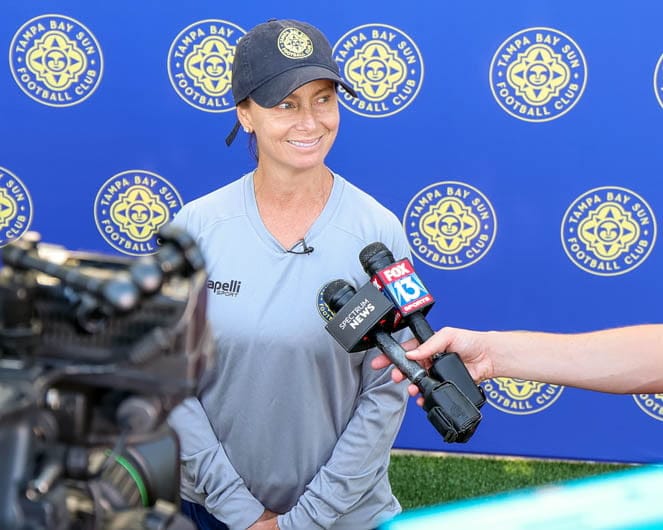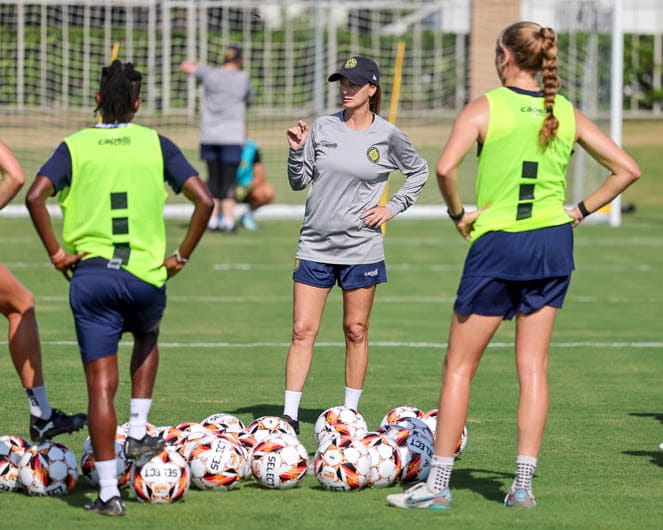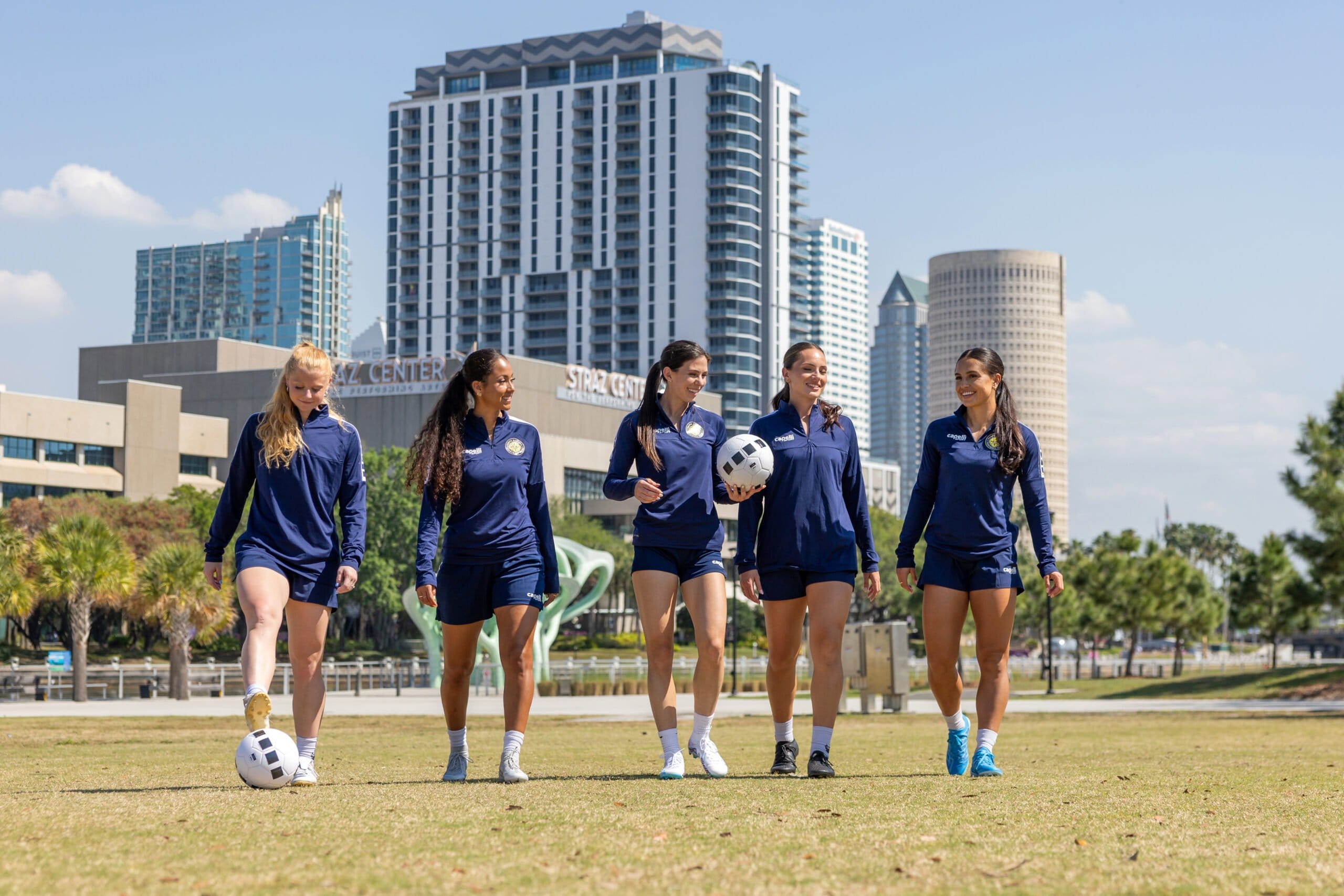Tampa Bay Sun FC: Ready to Kick Off a History-Making Season
The Tampa Bay Sun Football Club has officially kicked off its inaugural season at Downtown Tampa's Riverfront Stadium at Blake High School, bringing the highest level of professional women’s sports ever to the Tampa Bay Area.
The ladies are competing on the same major league level as the NFL, NHL, and MLB. Pretty awesome, right? This is not just a huge deal for our community but for women’s sports and little girls who dream big.
We recently caught up with head coach Denise Schilte-Brown, a mother of two college-aged kids. We’re talking about motherhood, leadership, and the future of women’s pro sports.

Tell us about the significance of bringing a women’s pro sports team to Tampa Bay and what that will mean to young people in our community.
Denise: This is really the reason for doing it. We have so many incredible opportunities for our male athletes in Tampa Bay, and this rich history of winning — because we’re “Champa Bay,” right? But for women, there’s been zero opportunity for them to live this life, playing the sport they’re passionate about, being able to make a living off of it and entertaining people with their skills. So, it’s just an incredible opportunity.
I believe that many of us have grown up watching men live this life, and living a life of envy, wanting to be able to do what they do — but there were no female role models and no opportunities. And now there’s, “see her, be her” — role models right there in front of her. So, it’s about the little girls who come and helping them live their dreams and see them come to life. I feel like a lot of them are just going to be so empowered and so excited.
It’s really exciting that some of our players are from the Tampa Bay Area. Going back to their high schools, middle schools and clubs so they can not only “see her, be her,” but they’re like, “Wow! I’m living in the same footsteps as these women who are now playing in front of me as professional athletes.” That’s pretty awesome.
How has your role as mom made you a better coach?
Denise: It’s such an incredible impact on my life, being a mom. Number one, just as a woman, it really changes you. You have almost an identity crisis having a child. It’s like you feel like you know who you are, and then all of a sudden, you’re responsible for this human being, and so it becomes very hard to go to work.
I think the most important thing in my life is raising my children, making sure that they’re happy and healthy. And it’s the biggest blessing and the biggest responsibility rolled into one.
So, you know, getting up and going to work is a lot more challenging, and I think I spent the first, at least, 14 years of their life debating every morning whether I should go to work or not. And I think that it’s okay for women to feel that way; they shouldn’t have to hide the fact that they are struggling to work when their babies are at home or their children are at home and somebody else is looking after them.
It’s okay to feel that way. It’s okay to stop working and raise them — that’s an awesome job and one that is so rewarding — but if they choose to keep going to work, I do think there’s a ton of value in it for our children, as well. And that’s what motivated me a lot, knowing that my daughter and son would be proud of the work that I was doing and the lives that I was impacting.
Even though I knew that all my players were somebody else’s children, I don’t think I realized that true emotion until I had my own children. I didn’t look at my players the same way anymore. They weren’t just my young women. They were somebody else’s daughters. So, I was having an impact on a lot of kids and a lot of daughters and that’s a pretty awesome opportunity in my life. And that’s what helped me get up every day and keep doing this.

What have you learned as a coach that has made you a better mom?
Denise: Having the twins and being a parent continues to make me a better coach. It hasn’t stopped for me. One of the biggest things I can tell you is that as they grow, I’m parenting the journey of my athletes. I understand my players’ emotions better now and what they’re going through because I’m seeing the flip side of it with my own children.
So, when my daughter doesn’t get to play because her coach hasn’t played her, or she’s received criticism, or she has anxiety about traveling — the multiple things that can happen to an athlete — I’m getting to be the mom of that now. So, I ask my players questions now that I never asked before, and I think about their emotions that I never even understood they were going through because I’m a parent now.
What inspired you to become a pro soccer coach?
Denise: I grew up in this incredible household where my parents were very fun and competitive, meaning everything we did, they turned into a game. They made life very entertaining and fun that way, but it also clicked a very competitive switch for me.
It was always fun, but it was always a game — there was always a winner or loser, and you’re allowed to joke about that and be very happy about winning, and it was OK to lose. So, I really love competition in general. Whether it’s cards or soccer, I like competing. I prefer there to be a winner or loser; I typically don’t just play for fun.
My dad was a hockey coach, and he loved coaching (he was really good at it), and I was around it a lot. He started coaching hockey when my brother was younger, and then I was always at hockey rinks with him while he was coaching. As he started the coaching older boys, I was even on the bench with him, watching him give instructions and just being the center of everything and, again, impacting all these guys’ lives.
On top of that, once I got to a certain level of soccer, he started trying to coach me in soccer as well, which was so fun. I think all women, we look up to our parents, and my dad wanted me to be a coach. I think my mom wanted me to be a doctor, so the coach seemed more realistic.
What lessons in leadership have you learned along the way?
Denise: I love leadership. I think, maybe, less “leadership” and more “empowering.” There are so many tools that help people feel empowered — mindset, goal setting, body language, self-talk — so, I’ve always really loved those, and I recognize there was this huge deficit in schools for that.
Students go to school, learn to socialize with each other, get instruction and learn many different subjects. But they don’t learn the intangibles of leadership and empowerment and confidence and things like that.
I’ve evolved into understanding that I don’t need a captain or a leader, that all my players can lead and contribute to the growth of the team. Naming one or two people as captains can be isolating and frustrating for other players who want to build a relationship with the coaches or the other players.
There are obviously going to be people that have bigger voices in one area, but there are going to be people who contribute to a different area using a different tool, so I don’t have captains.
What are you most excited about as you get ready to lead this inaugural season?
Denise: There are so many things to be excited about, but I’m really excited about the first competition — just being tested. Right now, we’re going to work on getting on the same page and getting excited about the way we play. But even in scrimmages, it’s never going to feel like a true test until that first competition.
I’m excited to see these women put on a great performance for everyone and be tested against a true opponent and watch these role models come to fruition for the little girls.
That image of a professional women’s athlete in Tampa Bay, it hasn’t happened yet. It doesn’t
happen until they step on the field and the little girls are there to watch them play. I’m excited for that moment.
For those who may not understand the significance of this team coming to Tampa for women’s sports, what would you tell them?
Denise: I think there’s a positive for everybody with the new team of Tampa Bay Sun FC. We’re going to have a positive impact on society, whether it’s the servant's heart of going into the community, or whether it’s being role models for little girls. It’s going to have an economic impact because we’re helping local businesses.
People will want to see us; they will want to attend games. So, it’s going to help Tampa Bay, it’s going to help our society, it’s going to help young women. They just need to find what they’re passionate about and link it up to what we’re about, and I think that they’re going to find a lot of synergy.
What are your hopes for women in pro sports in the future?
Denise: I still think there’s a huge gap from what the men are being paid and what is accessible to the men. The gap still needs to be closed. You’re thankful for every step that you’re capable of climbing, and you’re thankful that you’ve reached that point of the mountain—but until you’re sitting at the top of the mountain, there’s only one other person at the top.
I do believe that women’s soccer and professional sports for all women still have this gap to close. But I believe that everyone is working towards that. I think men are equally as involved as women are in trying to make that happen. I think half our viewers are men, I know our owners are men, I know people who are listening to us are men, so we feel very supported and excited about the future.
We have to keep going, and I think we’re going to get there.
What are you most excited about when it comes to being a part of the Tampa Bay community?
Denise: There are not many coaches who have been blessed to live in a city that they love, put roots into the city and feel like they’ve contributed to the city — and then they get the job that they’ve always wanted in that same city.
I was the USF coach, and I loved selling Tampa Bay to college kids so that they would experience what I love about it. But I’ve always wanted to be a professional coach, and here I am getting to be a professional coach in the city that I already love. It means a lot to me to help this team grow and help them be successful for Tampa Bay.
Anything else you’d like to add?
Denise: I’m thankful for all the parents out there who have supported their children in sports and understand that value, because it goes far beyond playing sports. It’s such a healthy arena to learn leadership tools, and I think the parents who afford their children that opportunity are awesome.
I hope that they will take the time to come out to our games and give women’s professional soccer a chance, because that kind of support from the families is going to help this team thrive and push women’s sports forward.
A Look at Downtown Tampa's Riverfront Stadium:
The team invested $6 million in upgrades to the stadium at Blake High School that the school not only has access to but will get to keep when the team moves to its permanent facility down the road. They’ve added and rebuilt seating to bring capacity to 5,000 fans, installed high-end FIFA-approved turf, upgraded locker room facilities, expanded concessions, and added a new state-of-the-art scoreboard.

Get Ready for Game Day:
There will be 14 home games this season, all at Downtown Tampa's Riverfront Stadium on Saturday evenings, with two this August:
- Aug. 18 at 6:30 p.m. against the Dallas Trinity FC
- Aug. 24 at 7 p.m. against DC Power FC
Season tickets are available for as low as $308 per seat, which averages out to $22 per game. And if you're interested in joining the Supporters standing-room-only section for the season, you can score tickets for $210 for all 14 home games. Single-game tickets are also available, starting at $29 each. *Ticket prices do not include taxes and other fees
To purchase tickets and learn more: tampabaysunfc.com
MORE stories we think you'll LOVE:
- Moms to Know: Meet Tori Penso, FIFA Women’s World Cup referee
- Moms to Know: Meet Christina Unkel with the Super League Tampa Bay


